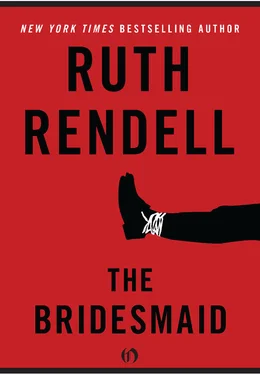Ruth Rendell - The Bridesmaid
Здесь есть возможность читать онлайн «Ruth Rendell - The Bridesmaid» весь текст электронной книги совершенно бесплатно (целиком полную версию без сокращений). В некоторых случаях можно слушать аудио, скачать через торрент в формате fb2 и присутствует краткое содержание. Год выпуска: 2010, Издательство: Open Road Integrated Media LLC, Жанр: Триллер, на английском языке. Описание произведения, (предисловие) а так же отзывы посетителей доступны на портале библиотеки ЛибКат.
- Название:The Bridesmaid
- Автор:
- Издательство:Open Road Integrated Media LLC
- Жанр:
- Год:2010
- ISBN:нет данных
- Рейтинг книги:3 / 5. Голосов: 1
-
Избранное:Добавить в избранное
- Отзывы:
-
Ваша оценка:
- 60
- 1
- 2
- 3
- 4
- 5
The Bridesmaid: краткое содержание, описание и аннотация
Предлагаем к чтению аннотацию, описание, краткое содержание или предисловие (зависит от того, что написал сам автор книги «The Bridesmaid»). Если вы не нашли необходимую информацию о книге — напишите в комментариях, мы постараемся отыскать её.
The Bridesmaid — читать онлайн бесплатно полную книгу (весь текст) целиком
Ниже представлен текст книги, разбитый по страницам. Система сохранения места последней прочитанной страницы, позволяет с удобством читать онлайн бесплатно книгу «The Bridesmaid», без необходимости каждый раз заново искать на чём Вы остановились. Поставьте закладку, и сможете в любой момент перейти на страницу, на которой закончили чтение.
Интервал:
Закладка:
One day, in his lunch hour, he found the building in which the company Arnham worked for had its headquarters. He passed its doors as he was walking back to head office, by a slightly different route than usual, from the cafe where he had his sandwich and cup of coffee. For some reason he was sure he would meet Arnham, that Arnham too, at this hour, would be coming back from lunch, but although he didn’t meet him, he came, in a way, near to doing so. He saw his car, the Jaguar, parked in one of the marked slots in a small parking area designated for employees of the company whose building abutted onto it. Philip would have said, if asked, that he didn’t remember the licence number of Arnham’s car, but as soon as he saw it, he knew it was the number.
His mother was in the kitchen doing a client’s hair. Philip thought this was one of the things he most disliked about living at home, to come in and find the kitchen turned into a hairdresser’s salon. And he always knew from the moment he let himself into the house. The smell of shampoo was rich and almondy in the air—or a worse smell if, as occasionally happened, she had been doing a perm. Then it was rotten eggs. He had remonstrated with her and asked what was wrong with the bathroom. Of course there was nothing wrong with the bathroom, but it had to be heated and why go to the extra expense when the kitchen, with the Rayburn going, was warm anyway?
As he hung his jacket up, he heard a woman’s voice say, “Ooh, Christine, you’ve taken a nick out of my ear!”
She wasn’t a good hairdresser; she was always having little mishaps of that sort. It gave Philip nightmares sometimes when he imagined a customer suing her over a burnt scalp or a bald patch suddenly manifesting itself or, as in this present case, a mutilated ear. No one ever had so far. She was so cheap, undercutting the salons in the High Road. That was why they came, these Gladstone Park housewives and shop assistants and part-time secretaries, as pinching and scraping and saving as she, as on the lookout for new ways to skimp. What with the cost of the hot water and the electricity, lighting the Rayburn when they needn’t have, not to mention all those mousses and gels and moisturising sprays, he doubted if his mother was much better off than if she had stayed what she said she was not long ago, a lady of leisure.
He gave them five minutes. That was enough to get his mother used to the fact that he was in. Fee was out somewhere, round at Darren’s place probably, but Cheryl was at home and in the bathroom. He could hear her transistor and then the water glugging out. He opened the kitchen door, making a throat-clearing sound first. Not that they could have heard him. His mother had the hand dryer on. Philip’s eyes went straight to the client’s ear, to the lobe of which adhered a lump of bloody cottonwool.
“I expect Mrs. Moorehead would like a cup of tea,” Christine said.
This, with the sugar she would ladle in and the cake she would eat, was another source of erosion into the four pounds fifty Christine got for a shampoo, trim, and blow-dry. But it was hateful thinking like this, despicable having to think like it. He was as bad as his mother, and if he wasn’t watchful, it would drive him to the extreme of offering the bloody woman a glass from their hoarded sherry stock. He could have done with one himself but had to be content with tea.
“Did you have a good day, dear? What did you do?” She had a quality of a kind of tactlessness, of saying, with the best of intentions, the wrong thing. “It’s a treat for us two old women to have a man to talk to, isn’t it, Mrs. Moorehead? It makes such a nice change.”
He could see the client, blonded, painted, fancying herself young still, draw herself up, her mouth pinched in. Quickly he began telling them about the house he had visited that day, the proposed conversion of a bedroom into a bathroom, the colour scheme. The kettle came to the boil, spluttered and bounced. He put an extra teabag in, though he knew the waste troubled Christine.
“Where was that, Philip? In a nice part, was it?”
“Oh, Chigwell way,” he said.
“This is a second bathroom, is it, dear?”
He nodded, passed the client her cup, set Christine’s down between the Elnett spray and a can of baked beans.
“We should be so lucky, shouldn’t we, Mrs. Moorehead? I’m afraid that’s beyond our wildest dreams.” Another wince, the Moorehead woman’s scalp knocking against the nozzle of the dryer. “Still, we must be thankful for what we do have, I know that, and Philip’s promised me a new bathroom here one day, a really luxurious one, and quite a cut above what we’re used to in this street.”
Mrs. Moorehead probably lived a couple of houses down. She had an angry aggressive look, but that was very likely habitual with her. He talked about bathrooms and traffic, about the springlike weather. Mrs. Moorehead departed, off to some Rotarians’ function, saying unnecessarily, Philip thought, that she wouldn’t give Christine anything over the odds because “you don’t tip the boss.” Christine started tidying up the kitchen, stuffing wet towels into the washing machine. He guessed there were potatoes baking inside the Rayburn and with a sinking feeling knew they would once more be having her favourite standby, a can of beans emptied over a split-open jacket potato.
Cheryl came in, dressed for going out. She sniffed, shivered. “I don’t want anything to eat.”
“I hope you’re not getting to be anorexic,” Christine said worriedly. She peered at her daughter in that way she had. It was as if by extending her neck and bringing her face within inches of the other person, symptoms disguised by distance would startlingly manifest themselves. “Will he buy you a meal?”
“Who’s ‘he’? There’s a crowd of us going bowling.”
Cheryl was nervous and very thin, her wispy fair hair touched here and there with green and standing up like a bottle brush. She wore skintight jeans and a bulky black leather jacket. If she wasn’t his sister, if he didn’t know her and what she was really like, if he had met her in the street, Philip thought, he would have taken her for a tart, a slag. She looked horrible, her face gleaming with gel, the lips almost black, her fingernails quite black like attachments of patent leather.
She was on something, he thought, but he didn’t want to think of it; he almost trembled when he wondered if it might be hard drugs. How could she afford it? What did she do to be able to afford it? She hadn’t a job. He watched her standing by the counter, investigating Christine’s bottles and jars, notably a new-type of foamy stuff for “sculpturing,” dipping in a black nail and sniffing it. If anything at all interested her, it was cosmetics, what she called the “beauty scene,” but still she wouldn’t apply for the beautician’s course Fee had suggested. Over her shoulder hung a scuffed black leather handbag. Once, a week or two ago, he had seen it lying about open and notes spilling out, tenners and twenty-pound notes. He had forced himself next day to ask her where the money came from, and she didn’t flare at him or get on the defensive. She just opened the bag and showed him its emptiness, the purse with fifty pee in it in loose change.
Philip was jerked from this reverie by Cheryl’s slamming the front door. He wandered into the living room, carrying his refilled teacup. In this room he never specially noticed the furniture but he noticed it now. It was recalled to him, as it were, by the reversion of his mind to the past, by the shock of the reencounter with Arnham’s world. The furniture was too good for the room which held it—well, all but the rented television set. Christine had been obliged to sell the house and most of what she had, but not her living room furniture, the settee and armchairs covered in hide, the mahogany dining table and chairs, the three or four antique pieces. It all looked incongruous in here, oversized, contrasting curiously with the tiles of the thirties fireplace, biscuitlike in shape and colour, the unpanelled doors, the wall lights of pink glass platelets. Curled up in the armchair, where he wasn’t supposed to be, Hardy lay asleep.
Читать дальшеИнтервал:
Закладка:
Похожие книги на «The Bridesmaid»
Представляем Вашему вниманию похожие книги на «The Bridesmaid» списком для выбора. Мы отобрали схожую по названию и смыслу литературу в надежде предоставить читателям больше вариантов отыскать новые, интересные, ещё непрочитанные произведения.
Обсуждение, отзывы о книге «The Bridesmaid» и просто собственные мнения читателей. Оставьте ваши комментарии, напишите, что Вы думаете о произведении, его смысле или главных героях. Укажите что конкретно понравилось, а что нет, и почему Вы так считаете.











